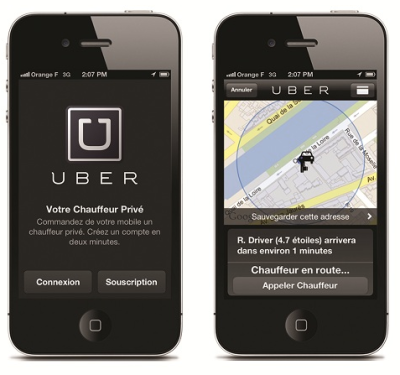>
My Sunday Washington Post Business Section column is out. This morning, we look at future of business, and the role disruption of entrenched interests is going to play.
The print version had the full headline “On Uber and the business model of disruption” while the online version is merely The future of new business is disrupting old business.
The issue isn’t merely the application of technology, but identifying a business where entrenched incumbents have managed to artificially constrain the proper functioning of markets.
Here’s an excerpt from the column:
“Consider Uber. How are the cabs in your city? In Manhattan, where I work, they are rather awful. They are uncomfortable and not especially safe (who wants to slam his face into a plexiglass wall covered with metal projections?). As bad as they are, they are typically unavailable when you need one. The second it begins to rain, it is nearly impossible to find one. And what idiot decided to do shift changes at 5 p.m. — right at the start of rush hour, when swarms of riders need cars, all of whom are unavailable as they are returning to the outer boroughs for their daily change of drivers?
But the biggest inefficiency is the limit on the total number of cabs, as mandated by Taxi and Limousine Commission rules. Hence, that monopoly supply limitation thwarted competition, reduced the available number of cars and allowed the value of medallions to skyrocket. The cabs are dirty and ugly, and the service is awful, but at least they are expensive and unavailable when you need one!
Until Uber rolled in. Since then, the value of a medallion has fallen substantially. The same is true in other cities where Uber operates…”
When “Rentiers” can limit supply, reduce competitors, or thwart new entrants, they can extract monopoly profits. Technology an break that artifice of the market.
Go read the entire thing.
Source:
The future of new business is disrupting old business
Barry Ritholtz
Washington Post, February 1 2015
http://wapo.st/1JUoWz0



“Business disruption model” has been used as an excuse by white collar criminals to break the law and feel smugly self-satisfied about it, and hardly anyone who engaged in or encouraged this law-breaking behavior has actually been called to account for it in the legal system — whether breaking taxi laws (Uber) or IPR laws (early YouTube) or zoning/condo regs and tax laws (AirBnB). Meanwhile, a black man who breaks up cigarette packs to sell single cigarettes (aka “business disruption model”) gets put in a choke hold and dies. I have sympathy for the people who think taxi laws are grossly uncompetitive and have resulted in terrible taxi service, and who feel it is justified to simply smash the old model. I’m just wondering when law breaking is considered “okay” and by whom, and I think it is interesting what our society tolerates in this regard and what it does not.
You are looking at one “white collar crime,” but ignoring the others — what of the crony capitalists who use regulation to thwart competition, new entrants, (and therefor prevent more job creation)?
Thats a giant fail on your part, and a lame argument for maintaining the status quo.
I wonder what the downside is for the drivers that work for Uber? I’m sure there is other unintended consequences. Have you considered those?
Regarding some of the other examples of services that need disrupting I do think they are ripe for disruption. Credit cards and doctors are to good examples. Maybe now that we are normalizing relations with Cuba we can streamline the process of bring some of their doctors over here.
The disintermediation of real estate agents would be a very good thing.
I don’t see it happening yet.
Uber it appears takes the car service model (where you call in advance of need) and applies it to a no wait situation. Of course car services have always had better cars. Between a car service and Uber/Lyft its really the app that makes the difference here. I wonder how many car service types have joined uber in as full time commercial ride providers.
~~~
ADMIN: I’ve taken Uber rides (outside of NYC) in Honda Civics and Nissan Altimas. Very different in the ‘burbs & hinterlands
Great piece.
As I view the same landscape, I see cycles of disintermediation and reintermediation.
To me, this framing is more helpful than the now-overused and not very informative ‘disruption’. A major macro trend of the internet age is the increase in the speed of these cycles. But, they are not new. As human civilization developed, new intermediaries have come into existence to increase efficiency compared to prior art and practice….only to be replaced by other intermediaries as technology advanced. Think about scribes to copy clay tablets or manuscripts getting replaced by printers, only to give way to e-books, to name but one small example.
These cycles also impact not only the market for labor but also the nature of the demand for labor. And sometimes, as is the case with Uber, the new intermediary (i.e., the app) is not human at all.
To me, Uber just seeks out people who are willing to work well below minimum wage, and then takes a cut to put them in touch with customers. They are only doing it in the Taxi industry because domestic workers would be too obvious.